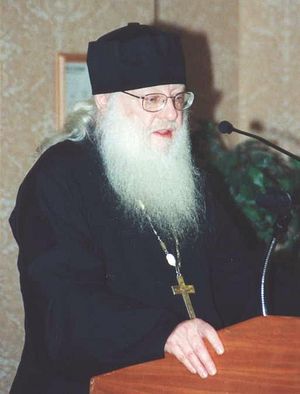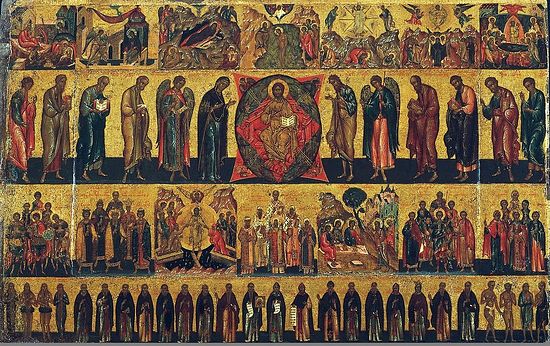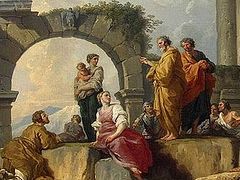Several years ago Fr. Alexey Young (now Hieroschemamonk Ambrose) gave a parish retreat entitled “Orthodox Spirituality” which was turned into a six-part VHS series produced by Christian Activist Productions. Fr. Alexey was a spiritual child of Fr. Seraphim Rose, and, as these videos attest, acquired his talent for synthesizing the Patristic Tradition and communicating deep subjects in easy-to-understand language. As the videos are in a format that cannot be posted we will be posting articles, with Fr. Ambrose’s blessing, based on notes on the videos, beginning with lesson one on the holiness acquired by the saints in their earthly life, appropriate for the feast of All Saints.
In order to talk about holiness, we need to talk about the saints, who are our best examples of holiness. For this purpose we must say that a saint doesn’t exist outside of Orthodoxy. Of course there are outstanding people—Mother Theresa for example, but in the precise Orthodox understanding sainthood is limited to the Orthodox Church.
It is a requirement for holiness to confess the Orthodox faith. False doctrine inhibits our movement towards God. It slows us down and prevents us from going the whole way to Him, whereas authentic doctrine illumines our path to God.1 St. Theophan the Recluse notes that false doctrine can result in profound inner unhappiness and emotional distress.
A saint is not simply one who has cultivated the virtues or one who controls himself through asceticism, but rather is the one who has Christ Himself living with him. Sainthood means having a completely organic relationship with Christ. A saint is one who is not separated from Him in any way. The saint has gone through the stages of repentance and purification to attain a remarkable state of union with Christ. This is the Orthodox doctrine of theosis. To become one with Christ is purpose of life.
Self-help and self-improvement groups prove ultimately meaningless when you consider that, in the end, you will die. As Fr. Seraphim was wont to remind me—all things pass away except for Jesus Christ. When we truly confront this reality, and the reality of death, then many things we thought were important begin to take a back seat.
But, death has been transcended. Death has been transfigured.
We feel unholy and unworthy when we hear in the Liturgy “Holy things are for the holy!” but the Church understands this and replies “One is Holy, One is Lord, Jesus Christ, to the glory of God the Father. Amen.” It is because of this Holy One that we have our hope. From Him comes forth all holiness.
Baptism and Chrismation enter us into the communion of the saints, into a new way of living, thinking, seeing, hearing, tasting, and touching. We join the ranks of those who have sought and found Christ and heard “I Am He.”
The saints debase themselves with startling humility. They had no pretensions about themselves, but we who are not saints sometimes pretend to be holy and righteous and hereby debase others, whereas a true saint makes us, the insignificant, feel loved. There was always a sense of stillness and peacefulness about Fr. Seraphim. Problems resolved themselves in his presence. Fr. Seraphim always accepted a person as he was, but could knock him down a peg when he was a fake.
We ought to struggle, repent, seek mercy, try to learn patience, try to have more love and humility, and so on. In doing so something begins to happen within us—we begin to realize that we have a quietness within us that didn’t originate from within us. This is the beginning of theosis. Christ says in John 7, He Who believes in Me, out of his heart shall flow rivers of living water. It begins as a trickle and then flows out through our whole being.
When we approach a saint we feel that he loves us and doesn’t exploit us. Saints are little christs. If we enter into a relationship with a saint by asking for his intercessions we will find there a beginning of warmth, and a sense that the saint is present and listening to us.
St. Gregory Palamas writes that God and His saints have the same glory and splendor because God deigns to share it with us. The saint reminds us that God loves us, and that he too was weak but that we all have the strength of being loved by Christ. We can return and find God, but if we abandon God then we become slaves of self-love, which destroys us and those around us.2 The saints reproach us.
A man dominated by self-love will soon be dominated by all the passions, sins, and temptations. One-by-one they will find a home in him. The solution is modeled for us by the saints—that is, living for Christ and not ourselves. Only then do we become real people. We learn real theology from being in the presence of a saint who is a clear icon of Christ before us. St. John of Damascus speaks of the saints as full of grace, which does not depart at death, and thus we have relics, and icons and such spiritual “artifacts.” God rests in His saints.
We can come to understand Who God is and who we are through the saints who are aflame with love for God. They remind us that something never ceases or passes away. God cannot hate, and God cannot get angry. God is only loving; and unless we reach a state of only loving, God will be Hell for us. Metropolitan Hierotheos says that contact with the saints reveals the hurt child within us.
But how can we experience the saints? It’s not enough just to ask their intercessions. To have a deeper, more meaningful relationship with a saint we must already imitate him in some way—to have contrition and a feeling of disillusionment in our own ability to accomplish spiritual tasks. Humility is the beginning of a true sense of reality—that is, that we have long way to go to reach God.
There are six kinds of saints, or six types of holiness, listed here in relative importance for the Church:
-
Apostles: their teaching is the foundation of the Church
-
Martyrs and confessors: they are an example to us of supreme sacrifice
-
Prophets: they foretold the coming of Christ
-
Hierarchs and teaching saints: they preserve unity among the faithful; this includes saints such as St. John of Damascus and St. Nikodemos of the Holy Mountain
-
Monastics: they have died in peace praying for the world
-
Righteous: they have attained holiness in the world by keeping the commandments, participating in the liturgical life of the Church, etc.; this includes saints such as Abraham and Sarah, Joachim and Anna, St. Joseph, etc.
St. Kosmas of Aeitola says that the martyrs are in Paradise with their blood, and he monastics with their ascetic life—and how shall we who beget children attain Paradise? By hospitality, relieving the poor, the blind, the lame (like St. Joachim), by almsgiving, love, and fasting which causes us to be enriched in body and soul.
The Righteous includes Fools-for-Christ who hide their virtues and endure contempt to achieve humility and patience. All these paths have the common basis of asceticism and spiritual work—that is, an athleticism of the spirit. The Orthodox saint is already a citizen of Heaven and helps us achieve that goal.
In Paradise, before the Fall, Adam had constant remembrance of God. His sin deeply darkened this, which was passed on to the rest of humanity. We bear signs of this corruption and decay and spiritual nature that are darkened by forgetfulness of God. The saints are those who have remembered God and are anxious to teach us to do the same.
Question: Could you elaborate on your statement that there aren’t saints outside of Orthodoxy?
Answer: For instance, there is a striking difference between Francis of Assissi and Orthodox saints. Francis identified himself with Christ many times when he experienced stigmata. We don’t identify with Christ but are saved by Him. We focus more on the Resurrected Christ.
Francis saw himself as especially singled out by Christ, but an Orthodox saint always sees himself as the least of all. Once when Francis was sick his doctor told him to eat meat, which was against the rule of the Franciscans. He felt so guilty that he went into the market, dumped ashes on himself, proclaimed his sin to all, loudly talking about how much of a wretch he was. Our saints never draw such attention to themselves.
Question: Could you elaborate on God not getting angry?
Answer: We must remember that the Old Testament isn’t the full revelation of God. We only see Christ angry once, when He drives the money-changers out of the Temple, which is an example of righteous anger because he was angry for the honor of the Father.
The Old Testament is more about how the Jews perceived God, and they were in a very imperfect relationship with Him. It’s not for us to judge those outside the Church, but we know that Orthodoxy is the fullness of truth.
Question: If we’re new to Orthodoxy, how do we discern what our distortions are?
Answer: It’s very important to read the lives of the saints. We have to start at a pre-school level before reading the Philokalia. Fr. Seraphim recommended that people read Dickens to show them normal life, to overcome hardness of heart. These writings show living theology.
We can watch and learn from others. We don’t need to know why everything is done, but just do it. Holiness needs to be studied in action. Read less theology and more lives of the saints.
Question: Could you compare and contrast Western asceticism and the western worldview with Orthodoxy?
Answer: Generally in the West asceticism came to be seen as an end in itself, but in Orthodoxy it is only a means to an end.
Question: Do saints continue to grow in holiness after death when they are united to Christ?
Answer: Yes, although we don’t know very much about this. We know our prayers for the reposed are beneficial in some way—they are unable to pray or give alms for themselves, so we can do it for them. This implies continuing growth and change. And remember, a person isn’t a saint until they die—he can always fall.






